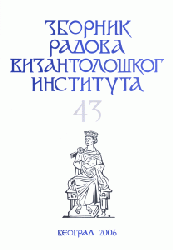U iščekivanju kraja - vizantijska retorika prve polovine XV veka
Waiting for the End - The Byzantine Rhetoric of the First Half of the Fifteenth Century
Author(s): Ninoslava RadoševićSubject(s): History
Published by: Vizantološki institut SANU
Keywords: Byzantium; fifteenth century; rhetoric;
Summary/Abstract: The Byzantine rhetoric, which was essentially a voice of the imperial ideology, serving to give expression to the aspirations of the World Empire, always had an idealized and rather abstract relationship with the reality. In the period of crises before the fall of Constantinople in 1453, marked by political turmoil, loss of territories, economic decay and moral decadence, the clash between the traditional rhetorical values and the obvious historical decline was immense. It was extremely difficult to reconcile the reality of the threatening Turkish presence in the Empire on the one hand and the feeling of belonging to the World Empire on the other, to harmonize the humiliating position as a vassal of the mighty conqueror with the traditional contempt for the barbarians, typical for the members of this highly civilized society. Ideologically, the Christian Empire of the East conceived of itself as the immediate continuation of the Roman Empire, whose destiny was to rule other peoples by divine providence. Culturally, the Byzantines considered themselves a part of the great Hellenic tradition, whose works constituted the basis of their education. These two fundamental pillars of the Byzantine identity were shaken by the predominance of the barbarian Turkish state in the East and by the recognition of the intellectual equality and economic preponderance of the Western civilization. The situation was additionally complicated by internal struggles and grave discords. Help from the West was to come only under the condition that the Byzantines accede to the Church Union, which seriously divided not only the clergy, but the Byzantine society as a whole. The Byzantine intellectuals escaped from this gloomy reality by fleeing into the hermetic world of the elitist literature. The present paper attempts to illustrate the state of the minds of the learned Byzantine authors of the time using a couple of particularly perspicuous examples. The literary production in the dramatically reduced and impoverished land was extraordinarily abundant, consciously open to the fresh influences from outside. The other way around, young people from Western Europe who were avid of knowledge considered their education incomplete if they had not stayed in one of the intellectual centers of Constantinople for some time...
Journal: Зборник радова Византолошког института
- Issue Year: 2006
- Issue No: 43
- Page Range: 59-71
- Page Count: 12
- Language: Serbian

